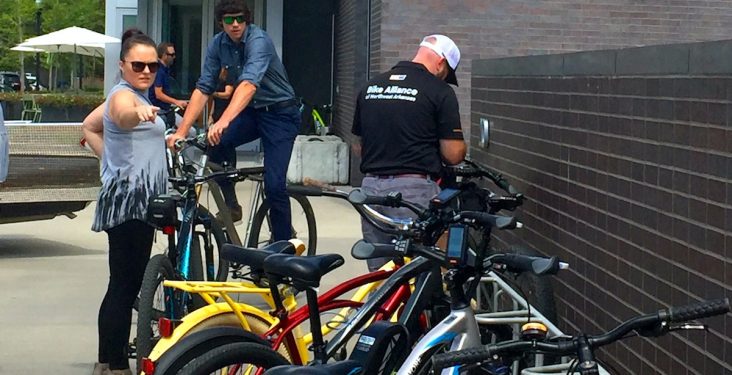Local cycling craze continues despite scooter disruption
by September 7, 2018 2:19 pm 1,721 views

Cycling enthusiasts retrieve their bikes in downtown Bentonville Thursday (Sept. 6) at the Greater Bentonville Chamber Business Side of Bikes luncheon held at 21C Museum Hotel.
Biking is big business around Northwest Arkansas with millions of dollars spent on an expansive labyrinth of trail systems suitable for various riding tribes such as mountain bikers, serious roadsters and the casual weekend riders from ages three to seniors.
Brendon Quirk, cycling director for the Runway Group, said cycling is a great social sport and utilitarian.
“A third lane on I-49 is not going to solve the traffic and transportation issues this growing region faces, nor will the widening of Eighth Street in Bentonville. Cycling and the infrastructure investments are also a sign we are a progressive community like Austin and Dallas,” said Quirk, a panelist speaking on the business of biking at the quarterly “Build Bentonville” luncheon, sponsored by the Greater Bentonville Area Chamber of Commerce and held Thursday (Sept. 6) at 21C Museum Hotel.
While the cycling craze is booming in the region, Quirk said there remains a lack of infrastructure for trails moving east to west. He said for biking to be seen as true mode of transportation there needs to be better connectivity across neighborhoods east to west.
Paxton Roberts, advocacy director for BikeNWA, and a panelist at the event, said as regional populations continue to swell with roughly 40 new residents per week, the transportation woes will worsen. He said bikes used for transportation could help relieve some of that pressure if residents feel safe and comfortable biking to work and social events.
A Walton Family Foundation study released earlier this year found biking to have an estimated $137 million economic impact in the two-county area. About $60 million is related to direct spending from tourists and locals, and there is improved public health from riding, Quirk said.
Quirk said the region is well-suited for multiple types of riding, from cross country mountain biking competitions at Slaughter Pen Trail in Bentonville to the prestigious Joe Martin Stage Race held in Fayetteville for road cyclists. But perhaps the biggest opportunity lies in enduro or endurance rides, given the total miles of connected trails in Northwest Arkansas. He said biking also continues to hold opportunities for entrepreneurs who want to try and solve for needs such as more bike sharing or bike rental opportunities.
Quirk told Talk Business & Politics while several of the local bike stores do rent, there is not enough rental bikes for the demand. He said bike sharing could be a better solution and the system recently installed at the University of Arkansas works well. He said for bike sharing to work there needs to be a critical mass of riders. Walmart has a bike sharing program at its home office campus in Bentonville and Quirk said anyone can ride these bikes but most do not know where their location.
Technology is also changing the cycling industry for the better in some respects as well as helping to fuel a disruption. Roberts said motorized bikes can be great equalizers for seniors, or those who want to ride them to work, and keep their cars parked. He said the cost of motorized bikes are starting to decline and they are easy to ride even for women in high heels and men wearing suits. He said while the rider has to peddle, the motor does most of the work, allowing the rider to go further, faster and barely break a sweat.
“I can see my 70-year-old mother riding the entire Greenway with me by using an E-bike. It’s a great way to give access to more places and people,” Roberts said.
He said there is also technology applications to better connect car drivers with bikers. For instance, car drivers could get an alert there are bikers around the corner allowing them to slow down before they see the bikers. Roberts said safer infrastructure for riders is also needed in the region, such as protected bike lanes where possible, and retrofitting neighborhoods to better handle all modes of transportation.
Talk Business & Politics asked Quirk about the electronic scooter craze which has taken over downtown Dallas in the past three months, and if the disruption is a possibility for the local area. A few months ago, bikes were seen on nearly every corner of downtown Dallas only to be replaced by electronic scooters this summer. Quirk said the electronic scooter disruption is gaining traction in cities that allow it such as Dallas. San Francisco, however, has banned them.
Quirk said just like Uber disrupted taxi services, bike-sharing startup Lime recently deployed 500 rental scooters in conjunction with a six-month pilot approved by the Dallas City Council in July. Consumers can rent the electric scooters to take short trips around the neighborhood. Lime reduced the number of bikes in Dallas and moved to the scooters citing rental bikes being stolen, damaged, picked for parts and abandoned on city streets. Santa Monica-based Bird found scooter success in Los Angeles, and is also part of the Dallas test with 500 scooters placed downtown in July.
Quirk expects to see scooters in Bentonville within a year. He said there are revenue sharing opportunities for cities to work with Bird and Lime and there needs to be solid ground rules for usage of motorized scooters to ensure the safety of pedestrians. The scooters can move at speeds up to 15 miles per hour and travel anywhere from 18 to 37 miles on a full charge.
Quirk said while scooters do offer another mode of quick transportation for a short distance, there is still room for those who enjoy biking. He doesn’t see the scooter disruption wreaking too much havoc on bikers in the region. He said bikers will have to share the same trails and roadways in the downtown areas that approve scooter usage.
